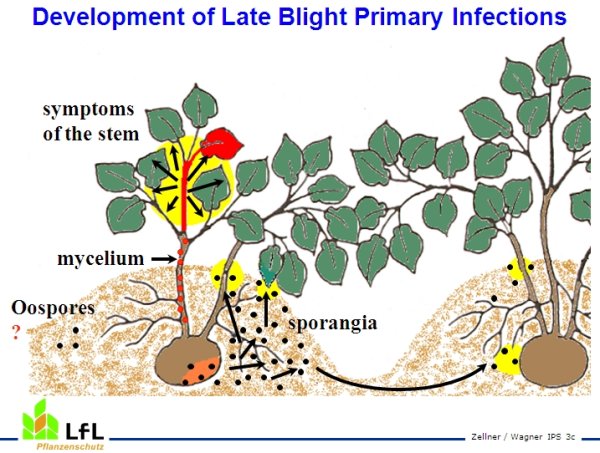Researchers at the James Hutton Institute and partner institutions are set to explore previously undiscovered mechanisms through which the pathogen responsible for late blight in potato, Phytophthora infestans, breaks through cell walls to infect plants.

Microbial pathogens cause US$300 billion worth of damage to global crop production annually, making the development of effective and sustainable disease control technologies vital for future food security, and oomycetes like P. infestans are some of the most damaging crop pathogens in agriculture and horticulture. Project leader Dr Steve Whisson, a molecular biologist at the James Hutton Institute’s Cell and Molecular Sciences department, said: “There are significant gaps in our knowledge of the molecular mechanisms underpinning successful host invasion by these pathogens”.
“We will study the activity and structure of the discovered proteins, their activity in induction of host defence responses, and determine their sites of action during plant infection”
“Penetrating the plant cuticle and cell wall is the first step in infection, and the cell wall represents the site of the major struggle between host and pathogen. Working with colleagues at the University of York, we recently discovered an unexplored mechanism in which Phytophthora weakens the plant cell wall during the early stages of infection.” The main research hypothesis of the project is that there are other factors that influence the establishment of P. infestans in a crop and identifying these will provide new targets for crop protection strategies.
Dr Whisson added: “To achieve this aim, we will use a combination of ‘omics’ strategies to identify candidate novel virulence factors. By using genetic tools, we hope to assess the importance of these proteins during infection. “We will study the activity and structure of the discovered proteins, their activity in induction of host defence responses, and determine their sites of action during plant infection,” co-investigator Dr Petra Boevink commented.
The project New Enzymatic Virulence Factors in Phytophthora infestans is a collaboration with the University of York, running from 2021 to 2025, and is supported with a £1m grant from the Biotechnology and Biological Sciences Research Council, part of UK Research and Innovation (UKRI). The James Hutton Institute’s Cell and Molecular Sciences (CMS) department is based in Dundee and comprises more than 100 plant scientists with research specialisms in cell and molecular biology, genomics, genetics, pathology and physiology.

A major research focus for CMS is on the genetic improvement of cereals, potatoes and soft fruit crops with respect to yield and quality, resource use efficiency and pest and disease resistance.
More information from:
Bernardo Rodriguez-Salcedo, Media Manager, James Hutton Institute








